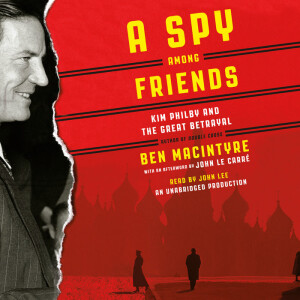
I thought I knew a lot about Kim Philby, the infamous Third Man of Cold War-era Britain. In 1951, Guy Burgess and Donald Maclean, two of Philby’s friends from university, were exposed as Russian spies, but were tipped off in time to escape to the USSR. At the time, and for years afterward, there were rumors of a third spy, a mole in England’s security service.
Macintyre’s astonishing account of Philby’s life, how he operated as a spy, and especially how he continued to escape detection until 1963, shows me how much more there is to the story. With penetrating insight, voluminous research, and access to newly opened files, Macintyre has fashioned an absorbing nonfictional narrative that helps us understand the man himself and the milieu in which he operated.
The title refers to E. M. Forster’s famous statement: “If I had to choose between betraying my country and betraying my friend, I hope I should have the guts to betray my country.” Forster spoke for a certain segment of English society. A generation later, it is the key to Philby’s choices: He gave his first loyalty to his true friends, the four schoolmates who, together with him, became known as the Cambridge spies.
Many people believed themselves to be Philby’s friends; however, extracts from his writings show what he really thought of them, even as he pretended to value them. Philby beguiled everyone he met.
The word most consistently used to describe Kim Philby was ‘charm,’ that intoxicating, beguiling, and occasionally lethal English quality. Philby could inspire and convey affection with such ease that few ever noticed they were being charmed. Male and female, old and young, rich and poor, Kim enveloped them all. He looked out at the world with alert, gentle blue eyes from under an unruly forelock. His manners were exceptional: he was always the first to offer you a drink, to ask after your sick mother and remember your children’s names. He loved to laugh, and he loved to drink – and to listen, with deep sincerity and rapt curiosity.
He was “the right sort,” a member of the tribe of Eton-educated, cricket-loving Englishmen who populated MI6—and other institutions—in class-conscious England. For such a person there was no need to inquire into their references, their past, or even their competence.
Part of what makes this book so fascinating is Macintyre’s portrayal of the competing cultures in the nascent security organisations of the time: MI6’s old-boy bonhomie, MI5’s mistrust of their rival’s upper-class blindness, the newly-formed CIA’s respect for their predecessor.
No one was more taken in than Nicholas Elliot, also of MI6. Over the thirty years that the two men worked and socialised together, Elliot never suspected that everything he shared with Philby went straight to the KGB. When the evidence finally mounted to a point in 1963 where MI6 could no longer deny the truth, they sent Elliot to debrief the man he had considered his best friend.
Using the transcript of that conversation, Macintyre fashions a stunning conclusion to this book, decoding the seemingly innocuous dialogue. A lengthy afterword by John le Carré includes his own memories of Elliot and the other players.
Subtitled Kim Philby and the Great Betrayal, this is a story that shows the human impact of these political intrigues. James Angleton, head of counter-intelligence for the CIA, also counted Philby as a friend. Macintyre’s description of the effect of Philby’s betrayal on Angleton stands in contrast to the Great Game, the name for the 19th century rivalry between Britain and Russia. Coincidentally, the term was popularised by Rudyard Kipling’s Kim, also the source of Harold Adrian Russell Philby’s nickname.
By immersing us in the moves and countermoves of individuals during the Cold War, Macintyre helps us see how it can come to seem like a game, and how it can become an addiction for men like Philby, Elliot, and Angleton. Then he shows us how the game plays out. Brilliant.
What nonfiction books have you read that are as absorbing as a novel?
